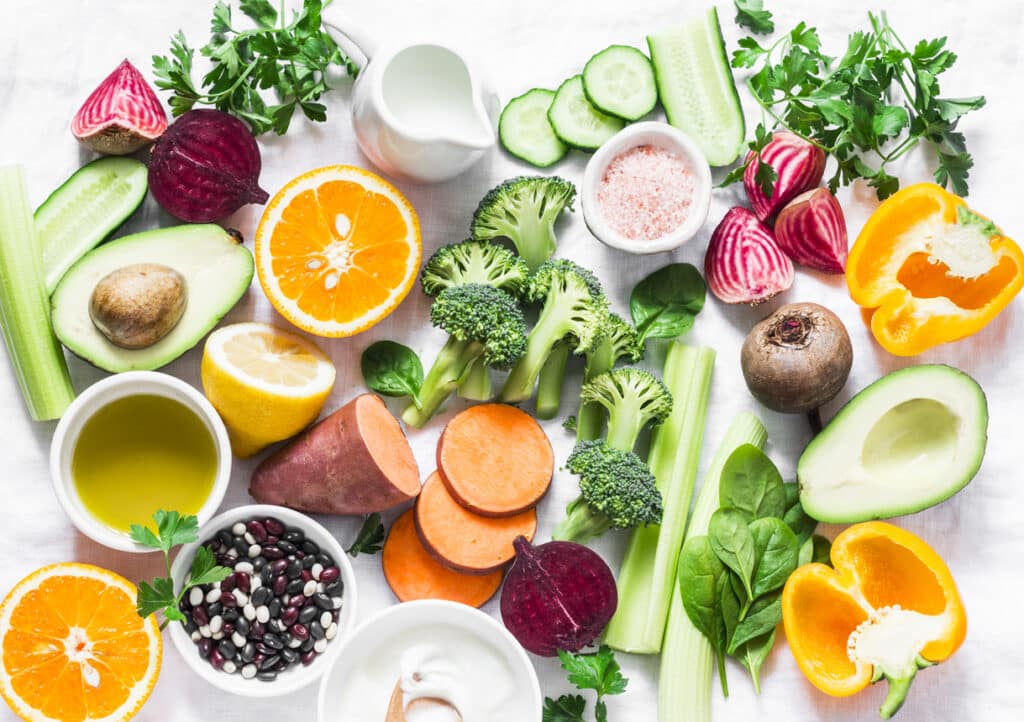It is no secret that everyone wants glowing wrinkle-free skin. The health of your skin is determined by many factors, even your gut health. It is a relatively simple science — whatever goes into your body is reflected on the appearance of your skin. For example, once you indulge in a week of mostly comfort foods like greasy pizza and double chocolate ice cream, your skin appears more washed out, blemishes appear, and even zits start breaking out. Most comfort foods lack the much-needed vitamins and supplements for the skin.
Eating a balanced and nutritious diet loaded with vitamins and antioxidants can do wonders for skin health. Yet, most people find tailoring their daily diets to include supplements for beautiful skin tiresome. This is where oral vitamins for skin health come in. By understanding the importance of specific vitamins and supplements for the skin, we can remedy almost all skin ailments.
Top Vitamins And Supplements For The Skin
Before including supplements for beautiful skin into your regimen, research how each of them is processed by the body. Many times, people without any deficiency consume skin care vitamins only for their bodies to pass out the excess through urine.
Another downside of taking the necessary vitamins through diet is that the body distributes the nutrients in equal amounts to all parts of the body. This means that the skin does not receive the supplements as desired. To counter this, topical application of the supplement for the skin is recommended. Here are some beauty supplements that everyone should take note of.

Vitamin A
This is easily one of the most vouched for supplements in the skin care industry. Coming in many forms, the most popular one being the over-the-counter retinol, vitamin A has a strong influence on an individual’s skin. Also known as the anti aging supplement, vitamin A helps reduce the wrinkles and fine lines that appear on the face.
You can increase your vitamin A intake by including carrots, broccoli, and whole grains in the diet. Note that topical vitamin A is not a quick fix for hyperpigmentation and fine lines. It takes time to show results and has side effects like increased sensitivity and susceptibility to sun damage.
Vitamin C
Mostly known for its antioxidant powers, vitamin C is needed most on the outermost and the innermost layers of the skin. Found in most collagen supplements, this vitamin keeps your skin young and healthy by playing a key role in the synthesis of collagen. Vitamin C is also needed for the prevention of dry skin and protection from the harsh UV rays of the sun.
Though deficiency of vitamin C is not common anymore, you can supplement your diet with citrus fruits like oranges or vegetables like broccoli and spinach to meet your dietary needs.
Vitamin D
Easily derived from a few minutes of exposure to sunlight, vitamin D plays a vital role in skin health. Vitamin D decides the tone of your skin colour and helps in soothing irritated skin. Topical application of vitamin D has been successful in treating the inflammation of the skin that comes with conditions like psoriasis.
Eating fortified cereals and vitamin D-rich foods like salmon, cod, and yogurt can be beneficial to the skin. There are many oral supplements for this vitamin because more often than not, people show a deficiency in vitamin D.
Vitamin E

Hands down, Vitamin E has been among the most popular vitamins for skin health in the recent decade. With research showing its potency in treating burns, scars, and wounds, Vitamin E is becoming a common ingredient in skin care products. Moreover, it has antioxidant properties that fight the free radicals and decrease sun damage to the skin.
Combined with Vitamin C, it boosts the effectiveness of sunscreens on the skin. Released through the sebum from the pores, vitamin E improves the hydration of the skin and protects the skin barrier. It can be found in nuts and seeds like sunflower seeds, almonds, and hazelnuts.
Vitamin K
Playing a prominent role in clotting blood, vitamin K helps the body to heal bruises and wounds. Studies have indicated that, in certain quantities, the vitamin can reduce stretch marks, dark circles under the eyes, and spider veins. The topical application of vitamin K is a recommended treatment for surgical scars.
Leafy greens are the best source of vitamin K and including them in your diet has more than one benefit. However, the pros of vitamin K in skin health have not been researched enough.
Zinc
Due to its lesser-known facts on the skin, zinc is an under-appreciated supplement. Crucial for treating the skin after ruptures and tissue damage, zinc accelerates the healing process of the skin. It has also shown a significant role in sun protection and safeguarding the skin against free radicals.
A severe shortage of zinc in the diet presents skin conditions like eczema in people. Legumes, shellfish, eggs, and nuts are a few healthy sources of zinc.
Selenium
Having a significant role in the protection of skin from the adverse effects of sunlight, Selenium is yet another anti aging supplement. Even though it is found in typical diets, most people get less selenium than is needed by the body. It can be found in wheat, poultry, and crabs. The mineral is also highly recommended for treating dry skin and healing any tissue damage.
Fatty Acids

Omega 3 and Omega 6 fatty acids are essential supplements that any healthy diet should include. Mostly found in nuts, grains, soy, fish, and oils, they help in producing the skin’s natural oil barrier and prevent dry skin.
Moreover, fatty acids promote fresh-looking skin and prevent conditions like whiteheads and blackheads. Unlike most nutrients, fatty acids are not naturally produced by the body so it is important to supplement through diet.
Final Words
The skincare industry is ever-expanding the ever-evolving skincare trends. It is easy to get hooked on various products that claim to benefit the skin while actually causing irreversible damage.
Consult a specialist before making changes to your tried and tested skincare routine. Bear in mind that there is very little that vitamins and supplements for the skin can’t fix. Pick regimens that are suited for your skin type and always read the packaging for any allergens.
Remember, a skin care routine is not exclusively applying formulas and skin supplements onto the face but also taking care of your emotions, diet, mental and physical health.



